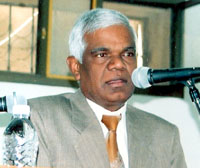
GITA: An epitome of the spirit of universalbrotherhood and unity underlying apparent multiplicities [Archives:2005/888/Education]
October 24 2005
 |
 |
Dr A. K. Sharma, Professor and Head of the Department of English in the Faculty of Languages, welcomed the guests and said no book exercised a wider or deeper influence on the Indian psyche than the Gita, which presented a coherent view of life in its totality. Writing a book on the Gita was like re-writing it; for an original and perceptive interpreter has to go through the same creative process as the composer. He further said that with the publication of a book like Dr Thakur's, our world view changes and in that sense our world changes a little. Presenting the book in modern aesthetic, philosophical and scientific perspectives, Dr Thakur has not only re-discovered the multi-layered message of the Gita but has also re-discovered knowledge constituting a living whole.
Speaking on the occasion, Dr Abdelwahab Magaleh, who has already translated Dr Thakur's book on the Gita into Arabic, paid profuse compliments to Dr Thakur for the unique book that he has written and said that Dr Thakur symbolized the three important concepts explicitly defined in the Gita, the concept of a pundit, the concept of a yogi and the concept of a sage. Dr A.K. Sinha, Professor and Chairman, Department of English, Faculty of Education, University of Hudeidah, said that by writing this out and out original book, Dr Thakur had created a beautiful ideological rainbow of seven colours, provided by literature, linguistics, statistics, stylistics, ethics, philosophy and science. He complimented Dr Thakur for highlighting the philosophy of “and” as opposed to the philosophy of “either or”.
The two persons who, on this occasion, presented a review of Dr. Thakur's book were Professor M.N.K. Bose of Ibb Univesity and Professor V.S. Dubey of Hudeidah University. In his review, Professor Bose said that Dr Thakur had de-mystified the Gita though he had not de-sanctified it. Dr Thakur, he said, had shown, great academic courage by trying to attempt his own translation of the text and by providing his own bold, original but highly convincing interpretation of this great text, bringing it close to the aspirations of today. He said that Dr Thakur has referred to as many as 160 sources and these references were from a large variety of disciplines like rhetoric, philosophy, physics, cosmology, medicine, and ecology; and when reading this book, the readers were bound to be amazed at the vast range of scholarship that had gone into making the ideological structure of Dr, Thakur's book.
Dr V. Dubey, who was the second scholar who reviewed Dr Thakur's book on this occasion said that in more than a thousand years of interpretations of this book, Dr Thakur's was the first to explicate the propriety of the title of this great classic. He said that Dr Thakur had beautifully explained that just as there could be no symphony without a harmonious orchestration of the notes, there could never be peace, prosperity and harmony in the absence of a harmonious togetherness. He particularly complimented Dr Thakur for referring to some of the recent findings of theoretical physics, to some of the findings of Quantum Physics, for example, and drawing the readers' attention to the fact that the ultimate reality was nothing but interconnectedness, interdependence and interwovenness and that the Gita had pointed this out thousands of years ago.
Dr Thakur himself said that what the world today needed was not mere materialism or mere spiritualism but a harmonious togetherness of the two. He supportively quoted Einstein who said that science without religion was blind and religion without science was lame and added that the world today needed that integrated philosophy of the two together, and that was what he had emphasized in his book. He said that the world today needed the philosophy of “and” and not the philosophy of “either or”. He said that the history of the world has seen and bitterly experienced so many philosophies that divide. It is time we identified the philosophy of universal brotherhood that emphasizes the unity underlying the apparent multiplicities.
Dr A Karuppaiyah, Ambassador of India, released the book and said that Dr Thakur deserved to be profusely thanked for writing that book of philosophy, the message of which was the message of unity and not of separation. The meeting ended with a vote of thanks and the giving away of complementary copies of the book to the Ambassador, to Professor Saqqaf, to Dr Abdelwahab Magaleh, to Prof. Dubey, to Profesor Bose and to Prof. AK. Sharma as an act of appreciation of their assistance at various stages of the completion of the book.
——
[archive-e:888-v:14-y:2005-d:2005-10-24-p:education]


